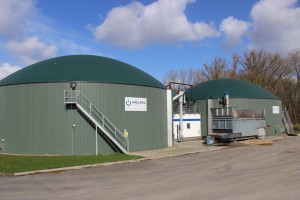 In January 2015, WELTEC BIOPOWER started building an anaerobic digestion plant in Loughgall, Northern Ireland. The customer and operator of the 500-kW plant is the vegetable producer Gilfresh Produce. The enterprise produces numerous field-grown products and processes them into food. „For WELTEC, this is the third plant in Northern Ireland and thus the eleventh in the UK, says Kevin Monson, sales manager of WELTEC BIOPOWER UK Ltd., in Stoneleigh, Warwickshire.
In January 2015, WELTEC BIOPOWER started building an anaerobic digestion plant in Loughgall, Northern Ireland. The customer and operator of the 500-kW plant is the vegetable producer Gilfresh Produce. The enterprise produces numerous field-grown products and processes them into food. „For WELTEC, this is the third plant in Northern Ireland and thus the eleventh in the UK, says Kevin Monson, sales manager of WELTEC BIOPOWER UK Ltd., in Stoneleigh, Warwickshire.
Thanks to Northern Irelands mild Gulf Stream climate, the products of Gilfresh grow well on an agricultural area of 1,000 ha. The product portfolio of the growth-oriented family enterprise includes root vegetables, salad crops and numerous cabbage varieties. The company which was established more than 50 years ago and has almost 130 employees also grows trend products like pak choi.
Gilfresh used to deliver the vegetable waste that accumulates in the sorting, washing and packaging processes to farmers as cattle feed. From July 2015, the waste and the vegetable washing water will be loaded into the bioreactor. To maintain an optimum stock level, an underground pre-storage tank is located before the two 2,625-m3 stainless-steel digesters; a 6,000-m3 tank is planned for gas-tight digestate storage. In addition to vegetable waste, cattle manure, chicken litter as well as whole crop, grass and maize silage will be used.
In line with the goal to constantly improve the ecological footprint, the decision-makers decided to supply their own energy: About 40 percent of the power generated by the 500-kW CHP plant can be utilised in the companys own production process. In the near future, the efficiency will increase even more due to the upcoming expansion of the cold storage. The excess power is fed into the public grid, and the process heat is made use of for heating the company buildings and for the production processes.
Such projects are necessary to enable the UK to provide 15 percent of their energy demand from renewa- ble energy sources by 2020. Furthermore, carbon emissions are to be reduced by about three quarters by then, compared to 1990. The UK have understood that besides wind and solar energy, another renewable source needs to be established in order to ensure reliable supply, and have subsidised bioenergy by means of measures such as attractive feed-in tariffs for regional power. „If other entrepreneurs follow the example of Gilfresh Produce, the United Kingdom will be able to reach the defined climate goals, says Kevin Monson.
Read more


